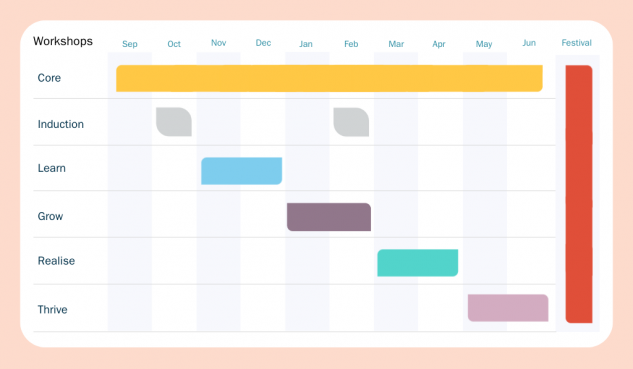All Researcher Development workshops
Year-round training to help you complete your research degree successfully and prepare for your future
RDP workshops for postgraduate researchers (PGRs) are organised by theme, matching Vitae's Researcher Development Framework, which you should use to develop the skills you need to be an effective researcher.
The most in-demand or essential Core workshops run several times throughout the year. Other sessions may only run once or twice in a specific two-month band. This means you can plan your time effectively and focus on particular skills alongside other PGRs, leading to a richer learning experience. The chart at the bottom of this page illustrates how the themes fit together month by month.
Explore the themes below or browse our scheduled events listings for sessions that are currently open for booking.
How does the RDP work?
Workshops are offered either online or in person, depending on the course content. The location will be listed when you register. For online workshops, the Zoom link will be listed on your Eventbrite booking page and in email reminders. Bookings close the working day before each workshop so you'll need to register well in advance.
RDP workshops are not recorded. If you register for a workshop you are expected to attend, or to cancel your place if you need to drop out. You can manage your bookings in Eventbrite.
Workshops with fewer than five bookings will be cancelled, with one week's notice, but we'll signpost other resources so you can get the support you need.
Accessibility
We are working to make our workshops as accessible as possible. When you register for a workshop you'll now be asked if you have any accessibility needs to help you engage with the session.
We will work with our facilitators to make any reasonable adjustments, whether that's providing materials in advance or in a different format, ensuring wheelchair space in a classroom, or giving audio descriptions of visual content during a session.
Please note we may not be able to meet requests made with less than one week's notice. Contact researcher-development@sussex.ac.uk if you have any questions around accessibility.
All in-person RDP workshops are delivered in the Library training or seminar rooms, or in the Student Centre for Careers sessions. See the AccessAble website for up-to-date Access Guides to campus buildings.
Other training resources
The RDP Online Canvas site includes several session recordings and modules you can work through in your own time, and additional training opportunities and online resources are listed on the Your Development webpages.
Your School or Faculty may also offer training; you should discuss your training needs with your supervisor regularly.



